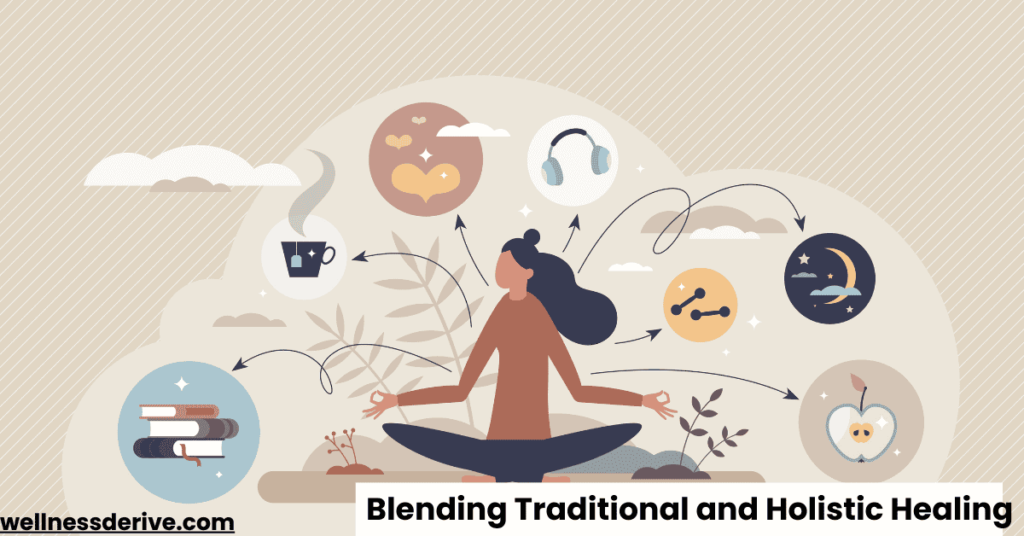Mental health care has evolved significantly over the years, moving beyond a one-size-fits-all approach. While traditional outpatient mental health treatment—such as therapy, medication management, and support groups—remains essential, there is growing recognition of the benefits of holistic healing in supporting overall well-being. A whole-person approach to mental health care acknowledges the deep connection between the mind, body, and spirit, integrating both conventional treatments and holistic therapies to foster long-term healing.
For those seeking outpatient care, blending these approaches can create a more balanced and personalized mental health journey. This article explores how outpatient mental health treatment and holistic healing can work together to provide comprehensive support for individuals struggling with anxiety, depression, trauma, and other mental health conditions.
What Is Outpatient Mental Health Treatment?
Outpatient mental health treatment is a flexible and accessible form of care that allows individuals to receive professional mental health support while maintaining their daily responsibilities. Unlike inpatient treatment, which requires hospitalization or residential care, outpatient treatment enables individuals to continue working, attending school, and engaging in family life while receiving therapy and other forms of support.
Common forms of outpatient mental health care include:
- Individual Therapy: Sessions with licensed therapists using approaches such as cognitive behavioral therapy (CBT), dialectical behavior therapy (DBT), or trauma-informed therapy.
- Group Therapy: Support groups or group counseling that provide shared experiences and coping strategies.
- Medication Management: Psychiatric care that evaluates the need for medications to manage symptoms of anxiety, depression, or other conditions.
- Behavioral Health Coaching: Guidance from mental health professionals to improve coping skills and develop healthier habits.
While outpatient treatment is effective, integrating holistic healing can enhance its impact by addressing mental health from multiple angles.
What Is Holistic Healing?
Holistic healing focuses on treating the whole person—mind, body, and spirit—rather than just targeting symptoms. It incorporates natural and alternative therapies that complement traditional mental health treatments, promoting overall well-being.
Common holistic healing practices include:
- Mindfulness and Meditation: Techniques that improve emotional regulation, reduce stress, and promote self-awareness.
- Nutritional Therapy: Understanding how diet and gut health impact mental well-being.
- Acupuncture and Energy Healing: Methods like Reiki and acupuncture that balance the body’s energy and promote relaxation.
- Herbal Medicine and Supplements: Natural remedies that support mental clarity, such as adaptogens and essential oils.
- Physical Movement: Yoga, tai chi, and other movement-based therapies that connect the mind and body.
By integrating these holistic methods with outpatient mental health treatment, individuals can experience a more well-rounded approach to healing.
How Traditional and Holistic Approaches Work Together
A blended approach to mental health care allows individuals to customize their treatment plan, incorporating both evidence-based therapies and holistic practices that align with their personal beliefs and lifestyles. Here’s how these approaches can complement each other:
Therapy and Mindfulness Practices
Talk therapy is a cornerstone of outpatient treatment, helping individuals work through past trauma, develop coping skills, and manage emotional challenges. However, incorporating mindfulness and meditation can enhance these benefits. Mindfulness techniques, such as deep breathing and body scans, help individuals regulate emotions in real time, reinforcing what they learn in therapy sessions.
Medication Management and Nutritional Therapy
For some individuals, psychiatric medication is a necessary and effective tool for managing mental health conditions. However, combining it with proper nutrition can further support brain health. Research shows that a diet rich in omega-3 fatty acids, probiotics, and whole foods can positively impact mood and cognitive function. Consulting with a nutritionist while undergoing outpatient treatment can help individuals optimize their diet to support mental well-being.
Group Therapy and Yoga or Movement-Based Therapy
Group therapy provides a sense of community and shared healing, while yoga and movement therapy help release stored tension and trauma from the body. Combining both approaches allows individuals to process emotions through discussion while also engaging in physical practices that promote relaxation and mental clarity.
Behavioral Health Coaching and Herbal Remedies
Behavioral health coaches help individuals create action plans for managing stress and improving daily habits. Adding herbal medicine to the mix—such as adaptogenic herbs like ashwagandha and rhodiola—can naturally support the body’s stress response, improving energy and resilience. Consulting with an herbalist or holistic practitioner ensures safe and effective integration.
Energy Healing and Trauma-Informed Therapy
For individuals dealing with trauma, traditional therapy methods like eye movement desensitization and reprocessing (EMDR) are highly effective. However, trauma is often stored in the body as well as the mind. Practices like Reiki, acupuncture, and somatic experiencing can help release trapped emotions and promote deeper healing.
The Benefits of a Whole-Person Approach
Combining outpatient mental health treatment with holistic healing offers several advantages:
- More Comprehensive Support: Addressing mental, physical, and emotional health leads to more sustainable healing.
- Personalized Care: Individuals can choose a combination of therapies that resonate with their needs and values.
- Reduced Side Effects: Holistic methods can help mitigate side effects of medication and therapy, such as stress-related fatigue or digestive issues.
- Empowerment and Self-Awareness: Integrating holistic healing fosters greater self-awareness and a sense of control over mental health.
Taking the First Steps Toward Integrative Mental Health Care
If you’re interested in blending outpatient mental health treatment with holistic healing, here are some steps to get started:
- Consult with a Mental Health Professional: Find a therapist or psychiatrist who is open to integrative approaches. Some providers specialize in combining traditional and holistic care.
- Explore Holistic Healing Practices: Identify which holistic methods align with your needs and preferences. Start with small steps, such as adding mindfulness or nutritional changes to your routine.
- Build a Support Network: Connect with communities and practitioners who advocate for a whole-person approach to healing.
- Listen to Your Body and Mind: Healing is not a one-size-fits-all process. Experiment with different approaches and adjust based on what works best for you.
Embracing a Balanced Path to Mental Wellness
Mental health care doesn’t have to be limited to one approach. By integrating outpatient mental health treatment with holistic healing, individuals can experience a more balanced and comprehensive path to wellness. The goal isn’t to replace traditional therapy or medication but to enhance and personalize care, making healing more effective and sustainable.
Whether you’re navigating anxiety, depression, or trauma, a whole-person approach offers the flexibility and empowerment to heal in a way that feels right for you. Remember, mental health is a journey, and blending different healing methods can create a stronger, more supportive foundation for lifelong well-being.
Disclaimer: The content on Wellness Derive is for informational purposes only and not a substitute for professional medical advice, diagnosis, or treatment. Always consult a healthcare provider for medical concerns.



